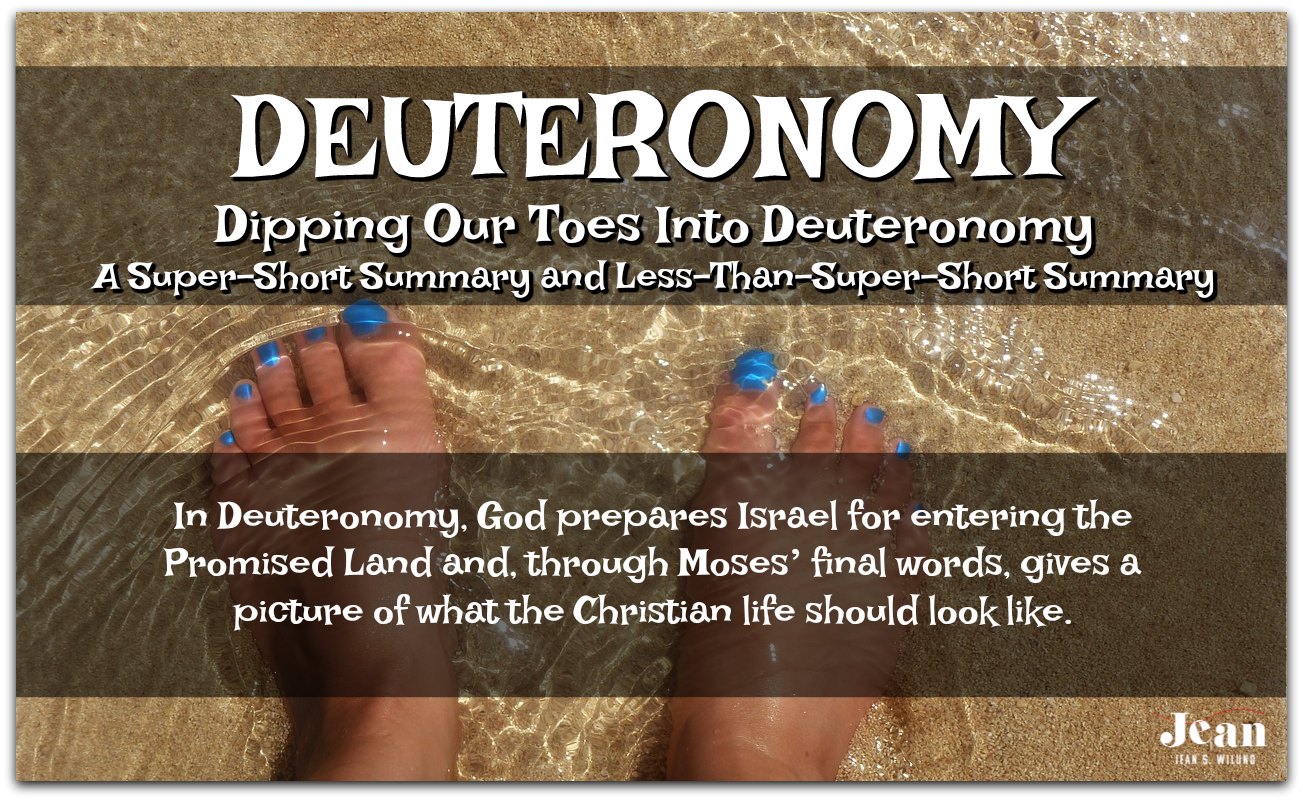Book #5 ~ DEUTERONOMY
Super Short Summary:
In Deuteronomy, God prepares Israel for entering the Promised Land and, through Moses’ final words, gives a picture of what the Christian life should look like.
Less Than Super Short Summary:
The curtain opens on Deuteronomy at the end of Moses’ life and the beginning of Israel’s new life in the Promised Land, the land of Canaan.
In Exodus, God had brought Israel out of slavery to Egypt, which gave us a picture of Jesus setting sinners free from slavery to sin.
In Numbers, Israel wandered the wilderness because of their unbelief. Even though God had promised to give them a land and His blessings to enjoy, they’d refused to believe Him.
Through Israel’s unbelief, God gave us a picture of Christians who’ve trusted Jesus to save them from sin and give them eternal life but refuse to trust Him for today’s challenges. Their fears and selfish pride keep them in a barren, wilderness-type life.
They never enjoy the full freedom Jesus promises to Christians who walk by His Spirit rather than by human effort. Bondage to fear and unbelief (often expressed by the less convicting word “doubt”) send them stumbling into sin and discouragement.
God provided for Israel in the wilderness, but He didn’t design the wilderness to be their permanent residence.
He brought them (us) out of slavery to Egypt (sin) for the purpose of bringing them into the Promised Land. There they could enjoy the fruit of His blessings (victorious Christian living).
All who refused to trust Him suffered loss. And Christians do, too. They will be saved from an eternity in hell separated from God, but they’ll miss out on God’s blessings in this life – the blessings of unshakable peace, joy in Christ, and much more.
Moses’ Final Words
In Numbers, God had told Moses he wouldn’t enter the Promised Land with the Israelites because he didn’t honor the Lord before the Israelites at the life-giving rock (Numbers 20:10-13).
In Deuteronomy, Moses was now 120 years old, but his eyesight hadn’t weakened, nor had his strength given out (Deuteronomy 34:7). Regardless, Moses’ apprentice Joshua would lead Israel into the Promised Land, not Moses (Deuteronomy 31:1-3).
But first, Moses had some final words for Israel – words they must always remember and never forget.
(The Hebrew name for Deuteronomy, Debarim, means the words.)
Always Remember, Never Forget
Moses began by reviewing Israel’s past since the time they’d left Mt. Sinai 40 years earlier. He reminded them of their rebellion and the painful consequences.
The rebels, however, weren’t Moses’ audience. Their children were. Their defiant parents had died.
But God’s promises lived on. Faithful to His Word, God was going to give the Promised Land to the children.
Before they entered, Moses made sure they remembered, through vivid recollections, how easily and often their parents had made empty promises to trust and obey God.
He then commanded this generation to remain faithful and obedient to God rather than to idols – worthless scraps of metal or wood, or anything they’d place over God.
He reminded them of God’s rules, regulations, and commandments (Deuteronomy 5), which were designed to lead them into right living and allow them to dwell safely in God’s presence.
The Shema
God then gave a command that later became a daily prayer for Israelites known as the Shema.
The word shema means to hear and listen in such a way as to elicit a response.
Hear, O Israel: The LORD our God, the LORD is one. You shall love the LORD your God with all your heart and with all your soul and with all your might. ~ Deuteronomy 6:4-5 ESV
The Shema is still prayed today by orthodox Jews.
Jesus quoted it when asked what was the greatest commandment.
Jesus answered, “The most important is, ‘Hear, O Israel: The Lord our God, the Lord is one. And you shall love the Lord your God with all your heart and with all your soul and with all your mind and with all your strength.’” ~ Mark 12:29-30 ESV
Warfare
To further prepare Israel for entering the Promised Land, Moses taught Israel how they must handle warfare.
They were to treat the people of the Promised Land (Canaan) differently than those outside it. The hearts of the people in Canaan overflowed with sin, making them ripe for judgment. God commanded they be devoted to destruction (Deuteronomy 9:4).
But those outside the Promised Land were to be shown mercy.
It can be hard to understand how a loving God could order entire cities to be devoted to destruction until you understand the depth of those nation’s sin and the mercy they could’ve enjoyed had they bowed to the Lord rather than raising their swords against Israel.
God is a righteous judge. The wonder isn’t how God could order Canaan’s destruction, but rather how He could have offered anyone extravagant grace and mercy.
Guard Your Heart
Toward the end of Deuteronomy, Moses addressed the condition of the Israelites’ hearts and alerted them to the many ways they’d be tempted to sin.
And he warned them that God would test them.
God would allow prophecies made by false prophets to come to pass in order to expose the true condition of the Israelites’ hearts. They needed to see for themselves when they saw their signs and wonders that they’d run after the false prophets’ idols rather than stay true to the one true God.
Everyone would see they didn’t want a true King. They wanted a Burger King. (♪Have it your way!♪ Have it your way!♪)
Blessing and Curses, Life or Death
Moses detailed the blessings God would pour out on them if they obeyed Him.
Astounding blessings! Surely Israel would faithfully obey so they could enjoy the many undeserved blessings the rest of their lives. (They didn’t!)
Moses also detailed the curses God would reign down on them if they disobeyed.
Terrifying curses! Certainly, they’d never risk forfeiting the great blessings by disobeying God and thus suffering the horrific curses. (They did!)
Regrettably, we’re not much different – if different at all. Too often we’d rather be our own god than serve the one true God.
Moses stood before Israel and commanded they choose. Life or death. Blessings or curses. (Deuteronomy 30:19-20)
Life and blessings were the obvious choices, but – Spoiler Alert – Israel often chose shocking sin over life-giving blessings. (Just wait until we get to the book of Judges! Oh my!)
God predicted Israel’s rebellion. He gave Moses a song to teach Israel which would stand as a witness against them that they’d been warned (Deuteronomy 32).
Moses then pronounced a blessing on each tribe of Israel (Deuteronomy 33). God’s grace in action.
Farewell, Moses
As the book of Deuteronomy closes we see Moses, the leader and prophet God called His friend, walking up to the top of Mount Pisgah. There the Lord showed him the Promised Land (Deuteronomy 34:1-4)
Then Moses, the servant of the Lord, died (Deuteronomy 34:5). He entered his rest and reward.
Hello, Joshua
Israel’s leadership passed to Joshua, who may have penned the final verses in Deuteronomy and this beautiful testimony to Moses:
“And there has not arisen a prophet since in Israel like Moses, whom the LORD knew face to face, none like him for all the signs and wonders that the LORD sent him to do in the land of Egypt, to Pharaoh and to all his servants and to all his land, and for all the mighty power and all the great deeds of terror that Moses did in the sight of all Israel” (Deuteronomy 34:10-12).







